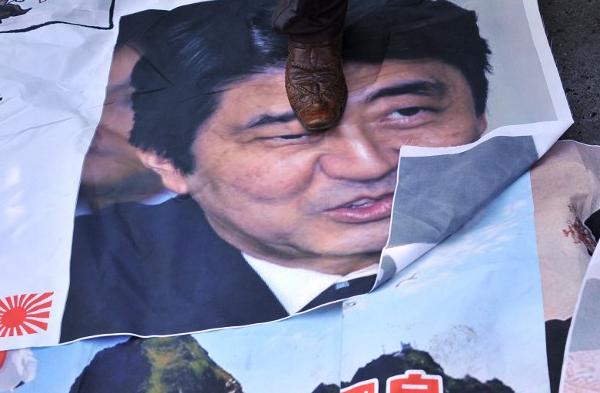
Protest against Japanese Prime Minister Shinzo Abe’s Visit to the Yasukuni War Shrine (Source: Xinhua)
A perusal of reader comments on Chinese news websites following Japanese Prime Minister Shinzo Abe’s recent visit to the Yasukuni war shrine in Tokyo reveals an online explosion of nationalist fury. Despite U.S. attempts to dissuade Abe from visiting the shrine and U.S. criticism following his visit, America has not been spared the anger of Chinese netizens. With his visit to the controversial shrine honoring Japanese war dead including convicted war criminals, Abe has stirred up a hornet’s nest of Chinese rage that ill-serves the interests of either Japan or America.
Official Chinese media have largely singled out Japan for attack over Abe’s visit to the controversial shrine, noting U.S. and global opposition to the visit while suggesting that America does not fully understand Japan’s “true nature” and intentions in the region or appreciate the true gravity of Abe’s actions. Nationalistic Chinese netizens have been far less sparing in their criticism of America’s relationship with Japan. Referring to the Japanese as “demons” (日本鬼子, “Japanese demons” or “Japanese devils”), netizens have accused America of creating and enabling a monster that threatens not only renewed imperial actions against China and other Asian nations, but even a new Pearl Harbor attack against America itself. Others dismissed U.S. criticism of Abe’s shrine visit as simple hypocrisy given America’s unwavering support of Japan since World War II.
The Chinese proverb “to raise a tiger invites calamity” (养虎为患) was invoked in comments to one article on U.S. criticism of Abe’s shrine visit, predicting that America would “eat bitter fruit again” (必将再次自食苦果) for its post-World War II support of Japan. Another comment at this article gleefully warned America to prepare for another Pearl Harbor attack from Japan, perhaps on Washington itself (米国,要做好日本再次轰炸珍珠港的准备! 这次可能是华盛顿了嘻嘻). Still another accused America of putting on an “innocent look” in the shrine affair that “doesn’t fool anyone” (美国装出了非常无辜的样子, 但是骗不了任何人). Repeated in comments to this article was the charge that Japan is a threat to world peace that America created and enables through its continued support (安倍拜鬼是对全世界爱好和平人民的挑衅, 是对二战日本军国主义的翻案!也是美国造就这一事实).
Comments to another article on U.S. criticism of Abe’s war shrine visit expressed even greater nationalistic rage against both Japan and America, and revealed the deep influence of Communist Party propaganda and brainwashing on ordinary Chinese citizens through party control of the media and the educational system. “We are the Chinese People’s Liberation Army founded by Chairman Mao!” wrote one commenter, “We’re not afraid of the Yankees! Even less afraid of little Japanese demons! We’re ready for battle! Firmly defend our beautiful motherland!” (我们是毛主席缔造的中国人民解放军! 我们不怕美国佬! 更不怕小日本鬼子! 我们都要做好战斗准备! 坚决保卫我们美好的祖国!). Another commenter again raised the specter of Pearl Harbor, warning that a “feral attack sooner or later” should be expected from the vicious Japanese “dog” that America raised from a defeated pup after World War II (美国养的狗, 迟早会野性发作, 再来一个珍珠岛事件). This vicious “dog,” according to still another commenter, “has not changed its nature and always thinks of making a comeback to dominate East Asia” (日本狗就是本性难改, 时刻不忘东山再起, 雄踞东亚!). In further comments to this article, U.S. criticism of Abe’s war shrine visit was again dismissed as “superficial talk” worse than even Japan’s behavior due to its presumed hypocrisy (美国人也就是表面说说! 他们比日本人更坏!). More succinctly and ominously, one commenter wrote: “Eliminate the little Japanese” (消灭小日本).
Elsewhere, the deep effects of Communist Party propaganda and brainwashing are again revealed. As one commenter to still another article on Abe’s shrine visit wrote: “Support our great Communist Party of China and the great people’s leader: President Xi. To love our motherland is every citizen’s responsibility. The motherland has a strong army, our youth are not afraid of blood sacrifice, to protect our beautiful homeland we will do our utmost to defeat Japan, and Japan will be destroyed” (拥护我们伟大的中国共产党, 伟大的人们领袖: 习主席, 爱我们的祖国是每个公民应尽的责任. 有强大的祖国军队, 我们年轻的一代不怕流血不怕牺牲, 为保护我们美好的家园尽自己的力量, 打倒日本, 让日本从此灭亡).
Evident in Chinese readers’ comments online is that China views the world through a very different lens from America, Japan, or any other Pacific nation; and that in the world through China’s lens, Japan is the preeminent threat and America is its chief enabler. At Ifeng, commenters predicted that Japan would be the cause of a third world war, casting Japan in the role of pre-World War II Germany, China as a new Soviet Union, and America as Neville Chamberlain’s Britain, inviting evil through its strategy of “appeasement” with Japan (多么类似二战前, 二战前德国面临的环境有张伯伦等人的绥靖政策, 企图挑起德国队苏联的战争, 然后自己坐山观虎斗. 如今美国扮演了当年英国的角色, 而中国扮演苏联的角色, 所以第三次世界大战不可避免, 同时美国必然深受其害, 战后由世界霸主被日本打回三流国家).
Thanks to Chinese government propaganda and brainwashing, China is a nationalistic powder keg ready to explode at the slightest provocation, not to mention a provocation as insensitive as the Japanese prime minister’s visit to the Yasukuni war shrine. Abe should have heeded U.S. warnings and considered this before taking such actions.